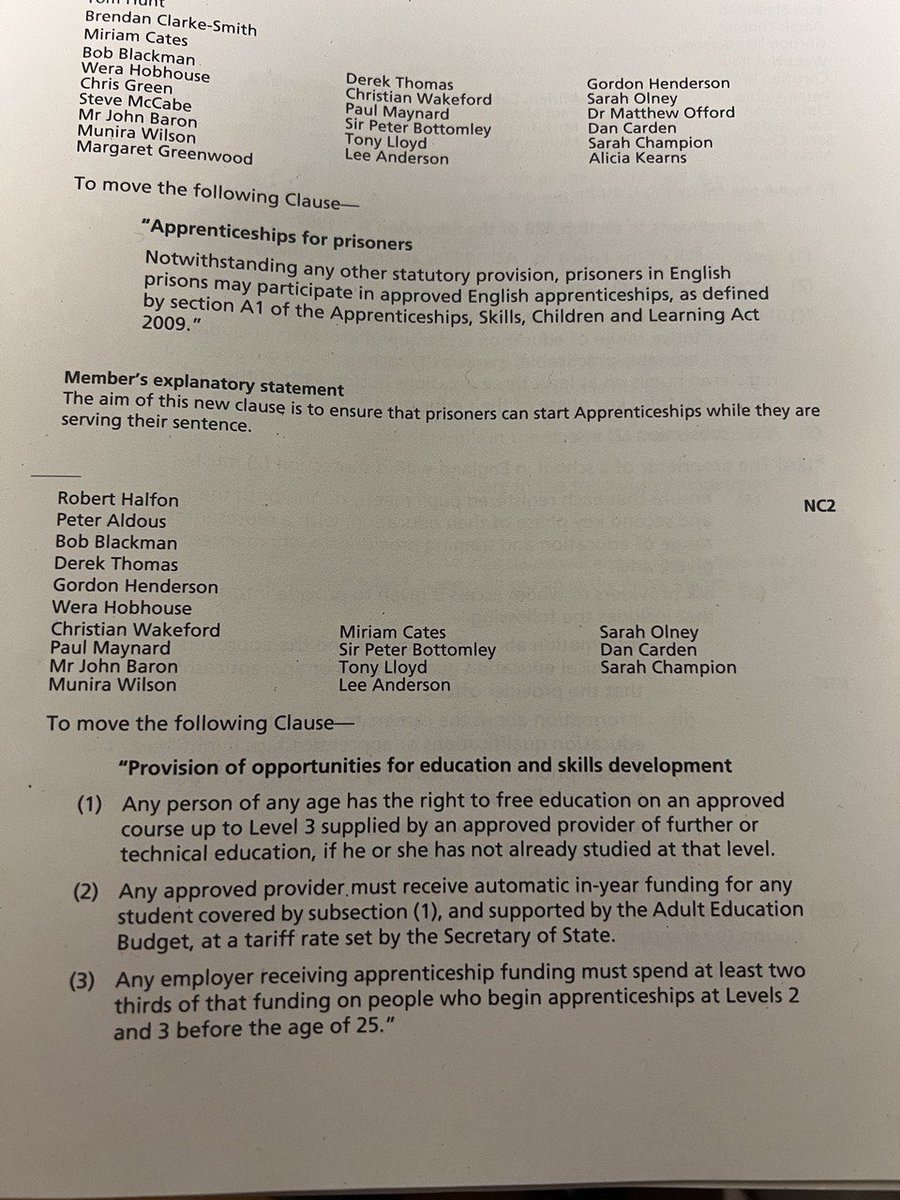Skills Bill Amendments – the ‘Baker Clause’ is now legally enforceable

Last night (21 Feb) saw a potentially highly significant amendment to the Skills Bill, particularly for careers advice and guidance routes for students.
The Baker Clause, a legal requirement since 2018, has been described in the past as the law without teeth after a 2019 IPPR report found that two-thirds of secondary schools deliberately float it.
Robert Halfon’s explanatory statement:
This amendment would have ensured that Section 2 of the Technical and Further Education Act 2017, commonly known as the Baker Clause, is legally enforceable.

Rt Hon Alex Burghart MP, Apprenticeships and Skills Minister said in response to careers advice amendments:
“On the amendments relating to careers information, advice and guidance, we have long been determined to improve the quality of advice on non-academic options in schools so that young people can learn about the exciting progression opportunities that a technical education or apprenticeship can offer.
“That is why, through the Technical and Further Education Act 2017, the Government introduced a new requirement for schools to provide opportunities for the providers of technical education and apprenticeships to visit schools to talk to all pupils in years 8 to 13.
“We are going further by putting into statute a minimum number in respect of those opportunities and setting parameters around their content.
“I reassure my right hon. Friend the Member for Harlow that we are very much setting the floor of our ambitions, not the ceiling: we want to see schools go further.
“My right hon. Friend the Member for Kingswood tabled amendments 8 and 7. Amendment 8 would require responsible authorities to ensure that the independent careers guidance provided to pupils in years 8 to 13 is provided by a person who is registered with the Career Development Institute who holds a level 4 qualification.
“I reassure my hon. Friend that the DfE statutory guidance to which schools must have regard already recommends that schools consult the UK Register of Career Development Professionals when they buy in a careers professional. Careers professionals on that register are required to be qualified to level 6 — above the level 4 specified in the amendment.
“Amendment 7 would require local authorities to have oversight of the independent careers guidance delivered in schools. The improvement of access to high-quality careers guidance is already driven locally by our network of careers hubs throughout the country.
“As members of the hubs, local authorities work in partnership with schools, colleges, employers and local enterprise partnerships to support, challenge and share good practice. We think that is the right role for local authorities to have.”


Robert Halfon, Chair of the Education Select Committee comments on the amendments on Twitter:
“The Skills and Post-16 Education Bill is an incredibly important Bill which will go a long way to revolutionise the Government’s skills agenda.
“New Clause 1 will ensure that prisoners can start Apprenticeships while they are serving their sentence. @CommonsEd inquiry into prison ed heard that investment in prison education is key to lowering re-offending rates, strengthening the workforce, & filling the skills gaps.
“New Clause 2 would provide funding for Level 2 education and skills training for any person of any age, providing they can demonstrate their intent to progress to Level 3.
“The Lifelong Learning Entitlement is a welcome intervention by the Government allowing for adults to undertake Level 3 qualifications but we know that many will not have the skills needed to go straight into Level 3 without initial support.
“Level 2 qualifications provide those who have left school without GCSEs or equivalent qualifications, with a vital second chance of learning. Enabling adults who need this additional support will help them develop the skills they need to undertake a Level 3 qualification.
“Finally, New Clause 3 will increase the amount of careers guidance encounters young people have whilst at school – namely to toughen up the existing Baker Clause. When I meet apprentices around the country, 8/10 tell me they did not know that apprenticeship pathways existed.
“Access to vocational and non-academic routes is essential to build the skills capital we need to meet the challenges of the fourth industrial revolution but it will also extend the ladder of educational opportunity to disadvantaged pupils across the country.
“I am delighted that the Government have already accepted this amendment and work is going to begin to introduce apprenticeships as well as further provisions to create a skills and training bridge to employment.
Sector response

Kieran Gordon, Executive Director of Careers England comments:
“Careers England welcomes the proposed amendment to the Baker Clause in the Skills Bill. The amendment seeks to open access to information on all future education and training options for young people during the key stages of Secondary education. By proposing enforceable expectations on schools there should be clear accountability where access to experiences and information on the wide range of career options are concerned.
“The fact that this is necessary sadly reflects on the distance yet to be travelled in ensuring all young people are given access to the careers advice support they need at school. Until all Gatsby Benchmarks are reached across all schools, and in particular all schools are adequately resourced to ensure that personal guidance (Gatsby Benchmark 8) is available from Level 6 qualified careers professionals, young people will lack the range of information and guidance needed at critical points in their development.”

Professor Tristram Hooley, University of Derby and Inland Norway University of Applied Sciences comments on the news
“The Baker Clause is vitally important to ensuring that the education system works in the interest of students. It is a shame that the Government seem to have passed up the opportunity to meaningfully strengthen it. But, the Baker clause is only a small part of the puzzle, we need to make sure that high quality career education and guidance are at the heart of our education system and that young people are supported to make transitions, access decent work and build a positive career. In the aftermath of the pandemic, the government desperately needs to up its game on career guidance or face the prospect of a lost generation.”

Thomas Burton, Group Director (Apprenticeships), NOCN Group said: “For too long the post 16 careers advice which school pupils receive, has often been underwhelming inadequate.
“Favouring a “A Level and University route” over providing clear advice and guidance which links to jobs and skills education.
“Yesterday’s Skills bill reading and amendments tabled by the right honourable Robert Halfon MP, is a potential watershed moment to pre-16 careers advice.
“I was in the 1990’s a product of a school system which existed to simply farm pupils into local 6th Forms and on to university programmes, under the Tony Blair’s vision of getting half of all young people into university.
“It was almost radical that I chose to attend a catering college away from my local town to follow a vocational career in Hospitality.
“It has since then become somewhat a passion of mine, that careers advice and particularly the advice on future jobs and the technical skills needed locally be taken more seriously by schools.
“The amendments tabled and enacted will require a mandatory three interactions by external providers and hopefully with the legal enforcement of The Baker Clause now in place end the monopoly which schools have on the high achieving pupils simply attended their own 6th Forms.
“Now it’s over to Ofsted to enforce the changes and ensure that the future of skills education in England is viewed with parity against the university route.”

Rebecca Durber, AELP Director of Public Affairs:
“It is vital that our young people are fully aware of all of the options available to them, as they consider their future careers. Much more must be done to ensure there is parity of esteem across academic and vocational pathways. That’s why AELP have long championed the Baker Clause- meaning that schools must allow FE providers to have access to pupils to inform them of approved technical education qualifications and apprenticeships. However, by the government’s own admission, compliance remains woefully low- with fewer than half of schools complying with the legislation. Therefore, the extension and enforcement of the Baker Clause has been one of our main lobbying calls as the Skills and Post-16 Education Bill has progressed through parliament.
“We were pleased to hear, during the debate, that Rob Halfon, Chair of the Commons Education Select Committee has received reassurances from ministers that they will be looking to bring in further measures to enforce the Baker Clause. We look forward to hearing more detail in due course.”

Chris Webb – Registered Career Development Professional (RCDP) and member of the Career Development Institute (CDI), Association of Graduate Careers Advisory Services (AGCAS) and the Career Writers’ Association, with experience delivering CEIAG in secondary education, FE and HE comments:
“As a number of my colleagues within the career development sector have already highlighted in their own commentary, while the Baker Clause is of course a key part of ensuring that young people are aware of all the education and training pathways available to them, it is important that we don’t conflate the provision of ‘encounters with training providers/employers’ with the delivery of careers guidance from a qualified professional. The former is vital information that helps young people develop an awareness of what options are out there for them but the latter is what helps individuals contextualise this information and consider how they might move forward with a pathway that best matches their skills, interests and motivations.
“For the Baker Clause to have a real and lasting impact on the career prospects of young people, I and many of my colleagues in the career development sector would strongly encourage the government to increase investment in career guidance and ensure that all young people have access to high-quality career guidance from a qualified professional throughout the various transition points they will experience during their education.”
What is the baker clause?
The Baker Clause came into force for schools and colleges in England on the 2nd January 2018. The current ‘Skills Bill‘ is seeking to re-invigorate this clause, giving Ofsted greater responsibility to oversee compliance.
Introduced as an amendment to the Technical and Further Education Act 2017, the Baker Clause stipulates that schools must allow colleges and training providers access to every student in Years 8 to 13 to inform them about approved technical education qualifications and apprenticeships.
Careers guidance and access for education and training providers.
The Department for Education (DfE) has updated the Statutory guidance for schools and sets out expectations for compliance, which include:
- Schools must act impartially and not show any bias towards any route, be that academic or technical.
- Schools should promote the full range of technical options.
- Schools must open their doors to other education and training providers, providing a range of opportunities for providers to talk to all year 8 – 13 pupils about their offer.
- Pupils should be aware of the benefits of apprenticeships, T Levels and other approved technical education qualifications.
- Schools should make every effort to improve their performance against the 8 Gatsby Benchmarks.
- Governing bodies and senior leaders should review their arrangements for provider access and prepare and publish a policy statement on the school website
What will Ofsted be looking for?
Ofsted has updated its school inspection handbook to strengthen the focus on careers guidance, including clarification that inspectors will always report where a school falls short of the requirements of the provider access legislation (Baker Clause) as well as considering how it affects a school’s inspection grade.
What are the governing body expectations?
Every school should have a member of their governing body who takes a strategic interest in careers education and guidance.
Furthermore, they should ensure that their school is meeting the statutory duty that all students are aware of the full range of academic and technical routes available to them at each transition point.
The governance handbook provides information on governors’ other legal duties, such as having a named Careers Leader, a ‘Provider Access Policy’ and that this policy is published on the school website.
Quick checklist for schools of the main requirements
- Identify a named Careers Leader.
- Create a Provider Access Policy Statement setting out the opportunities for providers to visit the school and the process to request access.
- Publish the statement on the school website.
- Review (annually) the effectiveness of the arrangements for your school and update your approach as appropriate.
The DfE funded ASK Programme entitles education establishments to access free support covering apprenticeship and other technical education options.
Robert Halfon MP’s explanatory statement:
This amendment will ensure that Section 2 of the Technical and Further Education Act 2017, commonly known as the Baker Clause, is legally enforceable.
Insert the following new Clause —
“Amendments to section 42B of the Education Act 1997
- Section 42B of the Education Act 1997 is amended as follows.
- After subsection (1) insert —
- “(1A) In complying with subsection (1), the proprietor must give a representative range of education and training providers (including, where reasonably practicable, a university technical college) access to registered pupils on at least three occasions during each of the first, second and third key phase of their education.”
- After subsection (2) insert —
- “(2A)The proprietor of a school in England within subsection (2) must —
- (a)ensure that each registered pupil meets, during both the first and second key phase of their education, with a representative range of education and training providers to whom access is given, and
- (b)ask providers to whom access is given to provide information that includes the following—
- (i) information about the provider and the approved technical education qualifications or apprenticeships that the provider offers,
- (ii) information about the careers to which those technical education qualifications or apprenticeships might lead,
- (iii) a description of what learning or training with the provider is like, and
- (iv) responses to questions from the pupils about the provider or technical education qualifications and apprenticeships.
- (2B)Access given under subsection (1) must be for a reasonable period of time during the standard school day.”
- “(2A)The proprietor of a school in England within subsection (2) must —
- After subsection (5)(a), insert —
- “(aa)a requirement to provide access to a representative range of education and training providers to include where practicable a university technical college;”
- In subsection (5)(c), after “access” insert “and the times at which the access is to be given;”
- After subsection (5)(c), insert—
- “(d)an explanation of how the proprietor proposes to comply with the obligations imposed under subsection (2A).”
- After subsection (9), insert —
- “(9A)For the purposes of this section —
- (a)the first key phase of a pupil’s education is the period —
- (i)beginning at the same time as the school year in which the majority of pupils in the pupil’s class attain the age of 13, and
- (ii)ending with 28 February in the following school year;
- (b)the second key phase of a pupil’s education is the period—
- (i)beginning at the same time as the school year in which the majority of pupils in the pupil’s class attain the age of 15, and
- (ii)ending with 28 February in the following school year;
- (c)the third key phase of a pupil’s education is the period—
- (i)beginning at the same time as the school year in which the majority of pupils in the pupil’s class attain the age of 17, and
- (ii)ending with 28 February in the following school year.””
- (a)the first key phase of a pupil’s education is the period —
- “(9A)For the purposes of this section —

Responses